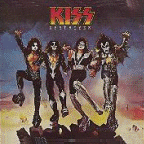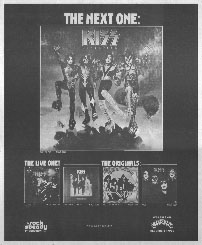- Home
- Introduction, Update Information, Links
- The Super Seventies "Classic 500"
- Readers' Favorite Seventies Albums
- Seventies Single Spotlight
- The Top 100 Seventies Singles
- Favorite Seventies Artists In The News
- Seventies Almanac - Year By Year
- Seventies Singles - Month By Month
- Seventies Albums - Month By Month
- Seventies Daily Music Chronicle
- Seventies Superstars In Their Own Words
- The Super Seventies Archives
- Seventies Trivia Quizzes & Games
- Seventies MIDI Jukebox
- The Super Seventies Bookstore
- The Super Seventies Photo Gallery
- Seventies' Greatest Album Covers
- Popular Seventies Movies & TV
- Seventies Celebrity Portrait Gallery
- Seventies Lyrics Hit Parade
- Top Seventies Artist Music Videos
- Seventies Usenet Music Forums
- Seventies Smiley Calendar
- EXTRA!
- Superseventies.com Facebook Page
- Superseventies.com Reddit Discussions
- The Super Seventies Blog
- Tweet The Seventies
- RockSite InfoBank
- Beatlefan Site
- Thanks For Your Support! / Top Sellers
- Search The Rock Site/ The Web

Destoyer
Kiss
Casablanca 7025
Released: March 1976
Chart Peak: #11
Weeks Charted: 78
Certified Platinum: 11/11/76



 There's no doubt that Destroyer
is Kiss's best album yet or that Bob Ezrin, Alice Cooper's heavyhanded wizard of heavy-metal production who helped write seven of the nine tunes here, has made the difference. But despite Ezrin's superb production, Kiss still lacks that flash of creative madness that could have made their music interesting, or at least listenable.
There's no doubt that Destroyer
is Kiss's best album yet or that Bob Ezrin, Alice Cooper's heavyhanded wizard of heavy-metal production who helped write seven of the nine tunes here, has made the difference. But despite Ezrin's superb production, Kiss still lacks that flash of creative madness that could have made their music interesting, or at least listenable.
The lead-off song, "Detroit, Rock City," begins with 90 seconds of Cooper-like effects: the sounds of the breakfast table and a news announcer in the background reading a story of a kid who died in a head-on collision; then a flashback to the doomed youth entering his car that night, his mind undoubtedly on the song that follows, and finally in the coda, the screeching crash. Unfortunately, Kiss entirely lacks the satiric distance that often made Cooper's use of such conceits genuinely funny, and worse yet, such gimmickry is the best Destroyer has to offer.
The songs, save for two bloated ballads, are relentless riff rockers rooted in patently pedestrian drumming. Although constructed with professional aplomb, making use of a wide array of heavy-metal conventions, there's nothing new here. Even when an effective melody, such as the rabble-rousing "Shout It Out Loud," is presented, the lackluster performances dampen the effect. The vocals are undistinguished and emotionally empty; the lyrics -- about partying and the rock scene, with plenty of campy S&M allusions -- trite. Worse yet, there's not a memorable guitar solo on the album.
- John Milward, Rolling Stone, 6-3-76.
Bonus Reviews!
This seems worth talking about only to the extent that it shows that not only can a "successful" act be illiterate and silly, but it doesn't even have to keep its affectations up to date. At first you hope it's a put-on (I still hope that piece in the Village Voice about the intellectual ramifications of Kiss' work was an attempted put-on) but then when you find nothing clever or funny or even interesting about it, you stop hoping for anything. "I feel up-tight on a Saturday night" seems to be Kiss' depth where lyrics are concerned, and the playing is of the Black Sabbath bash-crash sort; you must know at least five pathetic little garage bands that can do it. The theatrical part is just warmed over Bowie-Cooper-Peter Gabriel. But selling something everyone is tired of buying, or says he is tired of buying, does make a point of some sort, I suppose. Ah, America, you really miss P. T. Barnum, don't you?- Noel Coppage, Stereo Review, 8/76.
Destroyer is a logical step forward for Kiss. Paired for the first time with a forceful producer in Bob Ezrin -- who is both a master of studio technology and a classically trained musician -- Kiss has come forth with a concept album that explores the psychological ramifications of the members' stage personas via music that is by turns driving and dynamic, chilling and introspective. Moreover, Destroyer is sophisticated in a manner apart from standard heavy-metal fare: the intricate time signatures of "Detroit Rock City," for example, present a challenge to any rock musician. There is no doubt that Destroyer is Kiss's best album yet or that Ezrin has made the difference.
- David McGee, The Rolling Stone Record Guide, 1979.
Kiss followed the breakthrough Top Ten success of Alive! with Destroyer, the most pop-oriented record they had ever recorded. Under the direction of producer Bob Ezrin (Alice Cooper), the group's recorded sound became as theatrical as their live shows, featuring strings, sound effects, multi-layered guitars and vocals. That doesn't necessarily mean Destroyer is a better record than Dressed to Kill -- it means the album is a set of slick pop/rock that hides its lack of improved songwriting with stylish production flourishes. Despite the presence of the throttling "Shout It Out Loud" and "Detroit Rock City," none of the rockers are quite as direct and memorable as "Rock and Roll All Night," but that's remedied by the heavily orchestrated proto-power ballad "Beth." * * * *
- Stephen Thomas Erlewine, The All-Music Guide to Rock, 1995.
On Destroyer, better production captures the theatrics of Kiss, along with strings and a technically enhanced attack. "Detroit Rock City" is a challenging rocker in its own right, and the Peter Criss-sung "Beth," set the mark for myriad (lesser) power ballads spewed by various hair bands during the 80s. * * * *
- Allan Orski, Musichound Rock: The Essential Album Guide, 1996.
By the time their fifth album was released, Kiss was the most popular band in America, with sold-out stadium tours and eventually its own pinball machines, makeup line and a TV movie. Built around the proto power ballad "Beth," this is a ridiculously over-the-top party-rock album that just gets better with age.
Destroyer was chosen as the 496th greatest album of all time by the editors of Rolling Stone magazine in Dec. 2003.
- Rolling Stone, 12/11/03.
Flamenco guitar solos and steals from Beethoven are not obvious ingredients for success. Especially not for comic-book rock 'n' rollers famed for "Rock And Roll All Nite." Yet Destroyer is the iconic Kiss album.
Alive! (1975) bookended the band's primal phase, leaving them free to experiment. In came producer Bob Ezrin, who had honed his craft with Lou Reed and Alice Cooper. Envisaging Kiss as "a caricature of the urges of youth," he pushed them to transcend the groin-grinding of their earlier work.
The fruits included enduring anthems, notably "Detroit Rock City" (home of the aformentioned flamenco solo) and "God Of Thunder" (a Paul Stanley song that became Gene Simmons' signature tune). There were oddities too, including the hit ballad "Beth" and "Great Expectations," for which Ezrin raided Beethoven's Pathétique ("I laugh every time I hear it," he confessed to Kisstorian Ken Sharp).
Ezrin commissioned L.A. scenester Kim Fowley's help with the strugging "King Of The Night Time World" and "Do You Love Me?" -- and in a bid to bump up the running time, added sound collages at the start and close. An eerie 86-second coda mixes backward bits of Destoyer with a snippet from Alive! The package was wrapped in an eye-popping painting by Ken Kelly, cousin of fantasy artist Frank Franzetta; Def Leppard's Joe Elliott said, "I bought it purely for the sleeve."
Fans have debated Destroyer 's merits since its release, a fire fueled by the revelation that Ezrin had dumped guitarist Ace Frehley from two cuts. But the band have spent their career trying to match it.
- Bruno MacDonald, 1001 Albums You Must Hear Before You Die, 2005.
![]() Reader's Comments
Reader's Comments
No comments so far, be the first to comment .
![]() Main Page
| The Classic 500
| Readers' Favorites
| Other Seventies Discs
| Search The RockSite/The Web
Main Page
| The Classic 500
| Readers' Favorites
| Other Seventies Discs
| Search The RockSite/The Web




